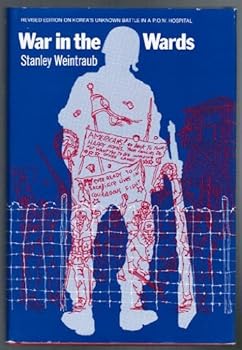War in the wards: Korea's unknown battle in a prisoner-of-war hospital camp
Select Format
Select Condition 
Book Overview
No Synopsis Available.
Format:Hardcover
Language:English
ISBN:0891410120
ISBN13:9780891410126
Release Date:January 1976
Publisher:Presidio Press
Length:202 Pages
Weight:0.88 lbs.
Customer Reviews
1 rating
A Story Of A Frustrating Fiasco
Published by Thriftbooks.com User , 17 years ago
"The War In The Wards" by Stanley Weintraub. Doubleday & Company,NY 1964. Stanley Weintraub is a prolific author. Anazon.Com has more than 16 pages, listing articles and books by Stanley Weintraub. Perhaps his most popular recent book has been "Silent Night", (2001), the story of the impromptu Christmas Eve truce in World War I. When Stanley Weintraub was a young Army officer, he was stationed at a Prisoner of War hospital camp in Korea, while the "Allies" and the Communists were holding truce negotiations at Panmunjom. The hospital was filled with fervent fanatics and with ordinary peasants. The Communists attempted to control them all. There were many "kinds" of prisoners: North Korean who were rabid communists; North Koreans who ordinary peasants drafted into the army; and South Koreans who had been forced to serve in the North Korean Army. POWs with leprosy were segregated for medical reasons. Was this separate leper camp improper according to the Geneva Convention for prisoners? Explanations were required, while the world's press looked on. The task of the captors, the Americans and South Koreans, was to screen the many prisoners so that the "principle of voluntary repatriation" could be applied. Of course, the rabid communists attempted to force the drafted simple peasants and the impressed South Koreans to opt to return to the "people's paradise" of North Korea. The author relates how certain parts of the hospital/camp reacted to these interviews and how the fanatical Communists attempted to force all prisoners to opt for the "people's paradise". Personally, last year, I had surgery and the nurse told me she toke out more than forty staples from my stomach. I felt totally helpless. Well, Weintraub describes how North Korean wounded prisoners were uncompromising in their devotion to communism. Double amputees would march around in the camp, on their bandaged leg stumps, (how did they do it??),fervently shouting anti-American slogans and claiming that the Americans were committing atrocities when they cut off food rations to prevent rioting in the camp/hospital. Rock throwing was constant. Riots and captures of the mess halls and medical stations were common. As an Army officer, Weintraub had to deal with the fervent Communists, the less than zealous peasants, and the impressed South Koreans who only wanted to return South of the 38th parallel. All of this frenetic activity took place while the United Nations watched and while the United States higher command (back in occupied Japan) imposed illogical constraints on the soldiers/guards at the site. What a fiasco! I do not think that the Officer Weintraub had much patience left with the Army Command back in Japan. His frustrations are recorded in this well written book.





